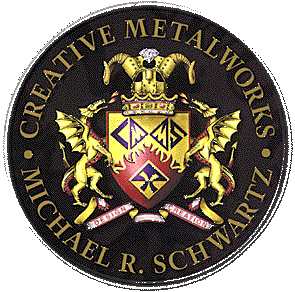| ||
|
|

The Liscum Bowl
The Liscum Bowl is one of the largest sterling silver objects ever made: 90 pounds, 40” across, 24” high, with a capacity of 14 gallons. It was created in 1900 by Japanese silversmiths from bullion gifted to the Ninth Infantry by Prince Li Hung Chang of China, in appreciation of their help in quelling the Boxer rebellion. It is one of the foremost trophies of any American regiment.
When the crate arrived at Creative Metalworks in Kensington, MD via military transport, it had traveled over 6000 miles. Inside rested one of the most significant sterling silver objects of the 20th century, The Liscum Bowl.
One hundred years after its creation, the bowl was in dire need of restoration: dented, crushed and battered, full of lead solder from poorly executed prior repairs, and missing talons and other segments of the ornate dragons. Michael R. Schwartz of Creative Metalworks was selected for the restoration project by the Center for Military History. Creative Metalworks has a national reputation for conservation and restoration of large precious metal objects for the museum industry.
The background of the bowl lies in the American Relief Expedition to China. On July 13, 1900, shortly after arriving on Chinese shores, the regiment was engaged in the conquest of the walled city of Tientsin. With the exception of a battalion of Marines, the 9th Infantry was the only American unit engaged in the struggle. In the course of the battle Col. Liscum was struck by Chinese fire, and shortly after directing his men to “Keep up the Fire!” on the walls of the city, he died. http://www.manchu.org/linage/liscum.htm
After Tientsin’s fall, the regiment discovered the smoldering ruins of a mint containing a vast storehouse of silver bars and coins, and turned it over to the Chinese Government. As a token of their appreciation, Prince Li Hung Chang presented the Regiment with melted silver from the mint fire.
In April 1902, after returning to the Philippines, the regiment shipped the fused silver to Yokohama Japan, where Japanese silversmiths were employed by Arthur & Bond to fabricate the bowl, tray and ladle in honor of Col. Liscum and his Regiments’ sacrifice. The bowl was completed on November 2, 1902, but the Regiment did not receive it until stationed at Madison Barracks, New York in April 1903. A set of 52 sterling cups, completing the collection, were designed and constructed from a portion of the silver by Chinese silversmiths.
The restoration of the Liscum bowl is now complete and it will be returning to Korea within a few weeks.



Return to Creative Metalworks Home


After all lead was excised from the inner liner numerous silver repairs were made with torch and high temperature silver solder.

The inner liner was forged back to its original form while removing dents and creases.

Mr. Schwartz working on one of the four 18" chased handles
Click here to see a short quicktime movie of cleaning the Liscum Bowl